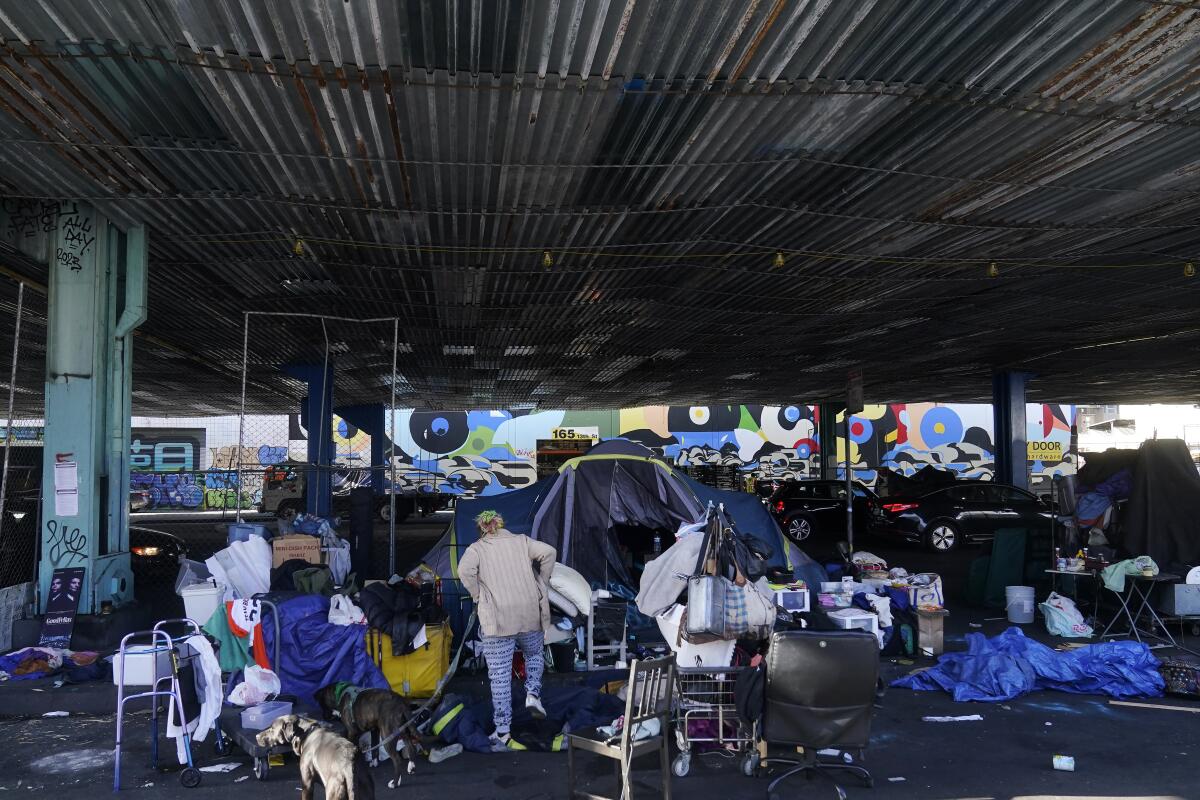California fails to track effectiveness of billions spent on homelessness, audit finds
California Politics
Mackenzie Mays April 9, 2024
California has failed to adequately monitor the outcomes of its vast spending on homelessness programs, according to a state audit released Tuesday, raising questions about whether billions of dollars meant to thwart the crisis has been worth it as the number of people living unsheltered has soared.
A new report from the California State Auditor’s Office found that a state council created to oversee the implementation of homele
ss
ness programs has not consistently tracked spending or the outcomes of those programs.
That dearth of information means the state lacks pertinent data
and
that policymakers “are likely to struggle to understand homelessness programs ongoing costs and achieved outcomes,” the audit says.
“The state must do more to assess the cost-effectiveness of its homelessness programs,” California State Auditor Grant Parks said in a letter sent to Gov. Gavin Newsom and state lawmakers Tuesday accompanying the audit.
California has spent $20 billion over the past five years dedicated to the state’s homelessness crisis, including funneling money toward supporting shelters and subsidizing rent. Still, homelessness grew 6% in 2023 from the year prior, to more than 180,000 people, according to federal “point in time” data. Since 2013, homelessness has grown in California by 53%.
The California Interagency Council on Homelessness created in 2016 to oversee the state’s implementation of programs dedicated to the worsening crisis has not ensured the accuracy of the information in a state data system and has not evaluated homelessness programs success, according to the state auditor.
The audit recommends that the state Legislature require that the council report spending plans and outcomes of state funded homelessness programs annually and to make that information public. It recommends a type of “scorecard” to track the success of programs.
The council consists of state officials including Health and Human Services Secretary Dr. Mark Ghaly and California Department of Corrections and Rehabilitation Secretary Jeff Macomber.
In a response to the audit’s findings, Meghan Marshall, executive officer for the council, said it has already “established a consistent method for gathering information on homelessness” but agreed with the state auditor’s recommendations and plans to pursue them “where possible.”
The council “appreciates [the state auditor’s] efforts to support and further our collective interest in providing oversight and accountability over homelessness funding,” Marshall said in a written response to the audit. is there anything spicier we can pull out? this quote is very blah. if not we can delete
Out of five programs analyzed, auditors found that two were likely cost effective: Project Homekey Newsom’s COVID driven project to convert hotels into housing and the CalWORKs Housing Support Program,
which
offers financial assistance and other services to low income residents. The others analyzed, including a state rental assistance program, could not be reviewed because “the state has not collected sufficient data on the outcomes of these programs,” according to auditors.
“Collecting and reporting all state homelessness programs financial data allows for more complete and timely information about the states overall spending on homelessness. It also makes possible greater coordination of homelessness programs funding and may enable costeffectiveness comparisons,” the audit stated.
Sen. Dave Cortese (D-San Jose) and Assemblymembers Evan Low (D-Campbell) and Josh Hoover (R-Folsom) requested that the Joint Legislative Audit Committee authorize a state audit of the efficacy of state homeless funding last year as California’s unhoused population the nation’s largest has continued to grow despite record state funding invested to combat it.
The audit also examines spending by the cities of San Jos and San Diego, which have both struggled to help unhoused residents. The audit found that neither of those cities have “evaluated the effectiveness” of their programs despite tens of millions in funding to respond to homelessness.
“San Diego has generally established clear performance measures, such as specifying the number of people the service provider will assist, to enable it to assess whether the providers efforts are an effective use of funds. However, San Jos has not consistently done so,” the auditor wrote.
Tuesday’s audit come
s
just weeks after voters approved Proposition 1, Newsoms $6.4-billion bond measure that aims to address homelessness in a new way by transforming the state’s mental health system, with a focus on substance disorder treatment.
San Jose has long been home to among the nation’s
largest homelessness encampments
, a stark juxtaposition against the backdrop of the Silicon Valley city’s stunning wealth.Cortese, who represents the district, said following the audit’s release on Tuesday TKTKTK.Among the state data available, the audit found that most homeless people in state programs end up in interim housing such as shelters not permanent homes.





